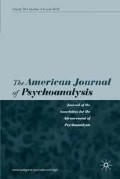Abstract
In the 21st century, the notion of trauma is so commonly used that one can speak of a culture of trauma. Today, a wide variety of people claim victimhood, pointing to their traumas as validation. Fassin and Rechtman denounce the way in which recognition strategies make use of the identity of victim to justify compensation policies and financial reparations. This paper presents Sándor Ferenczi’s contributions on trauma, showing how his theory takes into consideration relational and political aspects that were underemphasized by Freud. When Ferenczi is compared to contemporary recognition thinkers (such as Honneth, Fraser and Butler), one can see that what is at stake in his theory is neither identity nor victimization. It is deeper: Ferenczi shows the importance of the vulnerable dimension in all of us, suggesting that recognizing mutual vulnerability is a basis of the sense of connectedness and solidarity with the other.
Similar content being viewed by others
References
Adams, J. (1851). The works of John Adams, Second President of United States. Boston: Little and Brown.
Bhabha, H. (1994). The location of culture. New York & London: Routledge.
Borgogno, F., & Vigna-Taglianti, M. (2008). Role-reversal: A somewhat neglected mirror of heritages of the past. American Journal of Psychoanalysis, 68, 313–324.
Butler, J. (2003). Precarious life. The powers of mourning ad violence. London & New York: Verso. 2004.
Butler, J. (2004). Undoing gender. New York & London: Routledge.
Fassin, D., & Rechtman, R. (2007). L’empire du traumatisme. Enquête sur la condition de victime. Paris: Flammarion.
Fassin, D., & Rechtman, R. (2009). Empire of trauma: An inquiry into the condition of victimhood. Princeton, NJ: Princeton University Press.
Ferenczi, S. (1931). Kinderanalysen mit Erwachsenen. In Schriften zur Psychoanalyse II. (pp. 274–289). Giessen: Psychosozial-Verlag/Haland & Wirth. 2004. [Child-analysis in the analysis of the adults. In Final contributions to the problems and methods of psychoanalysis. (pp. 126–142). London: Karnac Books. 1994.]
Ferenczi, S. (1932a). The clinical diary of Sándor Ferenczi. J. Dupont (Ed.), M. Balint & N. Z. Jackson (Trans.) Cambridge, MA: Harvard University Press, 1988.
Ferenczi, S. (1932b). Reflexões sobre o trauma. In Obras Completas Sándor Ferenczi. (pp. 109–117). São Paulo: Martins Fontes, 1992. [Notes and fragments. In Final contributions to the problems and methods of psychoanalysis. (pp. 251–278). London: Karnac Books, 1994].
Ferenczi, S. (1933). Confusion of tongues between adults and the child. Final contributions to the problems and methods of psychoanalysis (pp. 156–167). London: Hogarth Press.
Fraser, N., & Honneth, A. (2003). Redistribution or recognition? A political-philosophical exchange. London: Verso.
Honneth, A. (1992). The struggle for recognition. The moral grammar of social conflicts. Cambridge, MA: The MIT Press.
Kelley-Lainé, K. (2015). Freedom to grow. American Journal of Psychoanalysis, 75, 57–64.
Kilborne, B. (2014). Trauma and the unconscious: Double conscience, the uncanny and cruelty. American Journal of Psychoanalysis, 74, 4–20.
Mucci, C. (2017). Ferenczi’s revolutionary therapeutic approach. American Journal of Psychoanalysis, 77, 239–254.
Ricoeur, P. (1993). Morale, éthique et politique. In Pouvoirs. Revue française d’études constitutionelles et politiques. N. 65, avril 1993.
Winnicott, D. W. (1967). Mirror-role of mother and family in child development. In Play and Reality. (pp. 111–118). London: Tavistock.
Author information
Authors and Affiliations
Corresponding author
Additional information
Address correspondence to Prof. Jô Gondar, Rua General Cristóvâo Barcelos 24 ap. 701, CEP 22245-110, Rio de Janeiro, Brazil.
Rights and permissions
About this article
Cite this article
Gondar, J. Ferenczi as social trauma thinker*. Am J Psychoanal 78, 412–420 (2018). https://doi.org/10.1057/s11231-018-9165-2
Published:
Issue Date:
DOI: https://doi.org/10.1057/s11231-018-9165-2




